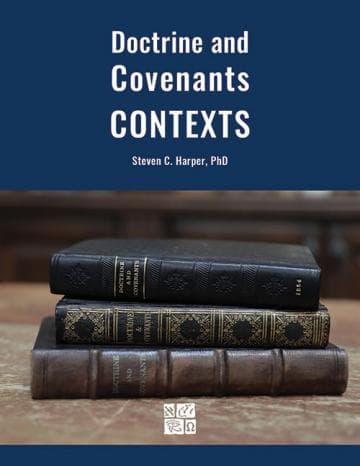Book
136 Chapters

Church members in Ohio, wanting to learn their duty and worried about their “spiritual and temporal welfare,” gathered on December 4, 1831.[1] The church grew larger and more complicated to manage. Many of the ablest Saints, including Bishop Edward Partridge, had migrated to Missouri to obey earlier revelations, leaving a large number of Saints in Ohio without a bishop. In a revelation a month earlier than section 72, the Lord had promised to call other bishops when he saw fit (D&C 68:14).
He saw fit in Section 72, which is actually a series of three related revelations given to answer the questions Joseph and others were asking. Verses 1–8 address whether the time is right for the appointment of a new bishop, and if so, who it should be. Verses 9–23 outline the duties of the new bishop. The Saints worried about overtaxing their resources in gathering to Zion in Missouri. They could not wisely arrive faster than Bishop Partridge could make land available for them to inherit. Verses 24–26 are an amendment to earlier revelations, given to regulate the gathering of Saints to Zion.[2]
“I cannot see a Bishop in myself,” Newel Whitney told Joseph after section 72 called him to that office, “but if you say it’s the Lord’s will, I’ll try.” Joseph replied that Newel “need not take my word alone. Go and ask Father for yourself.” Newel prayed privately for confirmation and “heard a voice from heaven tell him, ‘thy strength is in me.’” He found Joseph and told him he would accept the calling as the Lord’s bishop.[3] He confided to his wife, Ann, “that it would require a vast amount of patience, of perseverance and of wisdom to magnify his calling.”[4]
Early bishops like Edward Partridge and Newel Whitney did not preside over wards as bishops do today. That began in the 1840s. Their primary duty was to implement the law of consecration. They managed the Lord’s property and assets, relieved poverty, paid the Church’s bills, and literally built Zion as best they could. Having received his calling and confirmation of it by revelation, Newel Whitney did his best to serve as a bishop for the rest of his life. He was a great choice for the job. He was an experienced and able manager of properties, inventories, and accounts. Perhaps most important of all, he knew he was incapable of being a bishop unless he relied on the Lord for the patience, perseverance, and wisdom he needed.
The bishops were responsible to assist the members of the Literary Firm (see section 70) so they could concentrate on publishing the Lord’s revelations and selling the Book of Commandments widely, thus raising funds to support their own families and, hopefully, surplus to benefit the Church. In this way, assistance from the bishop would enable members of the Literary Firm to be faithful and wise stewards.
Section 72 is a blueprint for appointing bishops in all large branches of the Church to facilitate obedience to the law of consecration. If the Saints act on this blueprint, they will be obeying the law of consecration’s principles of agency (acting of one’s own free will to obey God’s will), stewardship (taking care of the Lord's property and business as commanded), and accountability (reporting to the Lord’s appointed servant, the bishop).
The Saints struggled to obey section 72’s command to gather to Zion only after receiving a recommend from the bishop to do so. Joseph wrote to Church leaders in Missouri that he rejoiced at the news that a group of Saints had arrived there safely, but “they left here under this displeasure of heaven.” Why? For “making a mock of the profession of faith in the commandments by proceding contrary thereto in not complying with the requirements of them in not obtaining recommends.”[5] William Phelps reminded the Saints of the revelation. He wrote in the Church’s newspaper that emigrating Saints would not be welcome in Zion “without regular recommends.”[6] Slowly the Saints began to comply with the revelation by receiving recommends before moving to Missouri.[7]
[1] “History, 1838–1856, volume A-1 [23 December 1805–30 August 1834],” p. 176, The Joseph Smith Papers, accessed June 5, 2020.
[2] “Revelation, 4 December 1831–A [D&C 72:1–8],” p. [1], The Joseph Smith Papers, accessed June 5, 2020; “Revelation, 4 December 1831–B [D&C 72:9–23],” p. [1], The Joseph Smith Papers, accessed June 5, 2020; “Revelation, 4 December 1831–C [D&C 72:24–26],” p. [2], The Joseph Smith Papers, accessed June 5, 2020.
[3] Orson F. Whitney, “Newel K. Whitney,” Contributor 6 (January 1885): 126; Poulsen, “The Life and Contributions of Newel Kimball Whitney,” 33054; “Aaronic Priesthood Minutes,” 1857–1877, March 3, 1877, Church History Library.
[4] Elizabeth Ann Whitney, “A Leaf from an Autobiography, Continued,” Woman's Exponent 7 (September 1, 1878): 71.
[5] “Letter to William W. Phelps, 31 July 1832,” p. 1, The Joseph Smith Papers, accessed June 5, 2020.
[6] “The Elders Stationed in Zion to the Churches Abroad, In Love, Greeting,” The Evening and the Morning Star, 2 (July 1833): 111.
[7] For examples, see Jan Shipps and John W. Welch, editors, The Journals of William E. McLellin (Urbana and Provo: University of Illinois Press and BYU Studies, 1994), 138.
Book
136 Chapters
Items in the BMC Archive are made publicly available for non-commercial, private use. Inclusion within the BMC Archive does not imply endorsement. Items do not represent the official views of The Church of Jesus Christ of Latter-day Saints or of Book of Mormon Central.